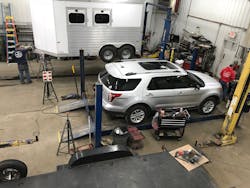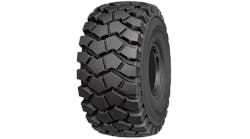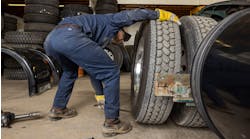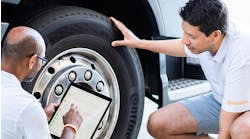Tips for Selling Trailer Tires and Towing Safety to Consumers
When John Davis opened his tire store on July 1, 2010, he knew there was a gap in the Chicagoland tire and trailer service market. Davis, who goes by JD, set out to fill it.
By 2014, he had created a successful business niche. Today, JD’s Auto and Trailer Repair in Lily Lake, Ill., specializes in servicing all varieties of tow-behind trailers and selling trailer tires.
A passion for trailers
Davis’ passion for trailers and tires goes back to his childhood. From an early age, Davis was mechanically inclined. He loved everything related to building or operating machinery, vehicles and trailers.
His enthusiasm was encouraged by his father, Jim Davis (JD Sr.) who owned and operated JD Trailers & Hitches Inc. in Carol Stream, Ill. From 1968 to 2002, JD Trailers & Hitches was the largest retail hitch facility in the Chicagoland area selling and installing trailer hitches, electrical systems, trailers and snowplows.
Growing up in the family business spurred Davis’ interest in trailer and automotive service work. Unfortunately, the senior Davis retired before his son graduated from college. John Davis never had the opportunity to officially work in the family business like his three older siblings.
Davis attended Augustana College in Rock Island, Ill., where he received a bachelor’s degree in business administration, with a concentration in marketing, in 2004. Upon graduation, Davis wanted to pursue his interest and follow his automotive roots. He accepted a position with an independent, multi-location tire dealer.
Davis was quickly promoted to assistant manager and then manager of his own location. During this time, he gained extensive tire knowledge and expertise through seminars and workshops as well as daily sales and service experience. He left the first tire dealer for another independent tire dealer closer to his fiancée, Manda, in 2007. They were wed in 2008 and moved back to the Chicagoland area in late 2009. By this time, Davis was ready to make the vision of his own shop a reality.
Davis believed he could use his tire, trailer and automotive expertise to execute his business plan. “I knew I could create a unique trailer service business by spreading the word that there is a shop providing top-notch service along with trailer and tire knowledge from actual experience.”
Real-world experience servicing trailers was a significant advantage for him. “Most of the places claiming trailer service as an offering are sellers of trailers and offer service simply to comply with their trailer manufacturers’ agreements,” explains Davis.
At first, Davis provided automotive repairs and passenger tire sales along with trailer service. He worked for four years carving out his specialized niche. Today, JD’s Auto and Trailer Repair is devoted solely to trailer service and employs two service technicians, a full-time sales person and Davis.
“This location is ideal for my specialized business,” says Davis. “We are close to Chicago, just over 40 miles, but far enough west to accommodate boaters, camping buffs and be immersed in horse country. Horse enthusiasts from several nearby farms swear by the service and quality of work we provide.”
The Lily Lake area is also very popular for landscape and other professionals towing trailers on a daily basis during their busy seasons.
“It is rare for more than a few days to go by without a customer stating they were referred by someone who told them JD’s is the only place to go for trailer work,” says Davis. “It is a great feeling to know you are filling a very-needed niche and filling it well.”
Win-win-win criteria
Davis attributes the business philosophies he follows to his father. The first philosophy is that all sales and service meet a “win-win-win” criteria. That means the client must benefit from the purchase or service, the trailer, or vehicle in the case of a hitch and wiring, must be improved, safer and/ or more secure after the purchase and, finally, the business must profit from the transaction.
“Profit is not a concept most consumers consider, but a business needs to be profitable in order to still be in business the next time the consumer needs them. And I don’t feel bad reminding clients of that fact when necessary,” says Davis.
Pay to play
“You’ve got to pay to play” is Davis’ second business philosophy, and he often communicates it directly to his customers.
Clients frequently will tell Davis the costs involved with their hobbies, such as boating, camping, horse showing and riding, car racing and showing and many more. Very rarely do they budget anything for trailer maintenance.
“Their trailer is the necessary evil to transport the precious animals or toys, but without it the toys don’t travel. Or worse yet, they are stranded on the side of the road due to lack of trailer maintenance. An annual trailer general service is a very economical insurance policy,” says Davis.
Every inspection starts with tires
Davis attributes much of his success to a focus on customer service and educating his clientele on safe towing habits and the importance of regular trailer maintenance. He developed his own inspection process for servicing trailers. Safety, function, and legal requirements for trailers are at the forefront of the trailer general service inspection at JD’s Auto and Trailer Repair.
The inspection always starts with all the tires, including the spare tire. First, technicians verify the existing tires are trailer tires, note whether they are radial or not and document the current and required pounds per square inch. Second, the tires are inspected for capacity verification. Third, the amount of visual and/or unusual wear is documented. Finally the date of manufacture is recorded.
Davis says it is important for consumers to understand the depletion of capacity and structural integrity trailer tires sustain from age alone. His thorough tire inspection process led to sales of over 400 trailer tires last year.
The general service continues with an inspection of all bearings, hubs/drums, axles, brakes when applicable, suspension, running gear, coupler, jack(s), frame, doors, ramp, and the exterior electrical system including running lights, turn signals, and marker lights.
To complete the service, technicians inspect and document all safety/emergency elements of the trailer including safety chains and breakaway systems. Once the inspection is completed, customers are given a comprehensive report on the condition of their trailer and an estimate for any additional work it requires.JD’s Auto and Trailer Repair performed over 200 general services in 2017. “We service a variety of trailers including gooseneck and pull-behind horse trailers, fifth-wheel and tow-behind travel trailers, open and enclosed utility, car hauler and snowmobile trailers, heavy-duty equipment haulers as well as boat trailers. Basically, any style trailer smaller than a semi-trailer,” says Davis.
His 3,000-square-foot building includes a show room, sales counter, waiting room, office space and a three-bay shop which accommodates several trailers at a time. The three bays prevent technician stalemate while waiting for an estimate to be written and customer approval.
Davis and his technicians utilize a unique lifting method for trailers. An asymmetrical auto lift is used at the rear of the trailer and a forklift with customized tongs is used at the coupler to raise the trailer to a comfortable working height. Jack stands are then placed under the tongue to secure the trailer while the service is performed.
JD’s tips for servicing trailers
Davis advises dealers to educate themselves in order to develop a comprehensive inspection report that fits the safety, function and legal requirements for the types of trailers they expect to service.
He also recommends establishing a regular service interval. “We use Dexter Axle’s recommendation of every 12,000 miles or 12 months whichever comes first. Then educate your customers on the importance of this preventative maintenance,” he says.
Also, try to avoid the “whack-a-mole” service motto. “Clients will often request you only look at a specific problematic issue not realizing it may be just one symptom of the true issue,” says Davis.
“When a trailer has issues a thorough inspection and general service will often find the root cause of those issues much more efficiently than chasing the symptoms. Securing consent for a general service allows the diagnostic time to find the root cause and will often save the client money and the trailer technician time and frustration.”
JD’s 6 tips for selling trailer tires
A trailer inspection documents the reasons for recommending new tires. The inspection should address six key areas.
1. Is there unusual wear? When the inner or outer portions of the tires have less tread life than the rest of the tire, determine the root cause of uneven tread wear. Is the trailer being overloaded? Is there an axle issue? Is the suspension worn out? Work with the customer to determine cause, solve the issue and then sell new tires that fit the needs.
2. Are the tires just worn out from the trailer being towed? If the tread life has expired or is on the verge of expiration, recommend new tires.
3. Are the existing tires under or barely adequate for trailer and load? Unfortunately, several trailer manufactures have the tendency to equip their trailers with the least expensive tire option which just meets the trailer’s capacity. That coupled with the fact many haulers push their trailers to the maximum capacity and beyond leads to tire failure, according to Davis. Many times, a simple upgrade to the next load range can solve this issue for a minimal cost difference to the consumer.
4. Are the existing tires actual trailer tires? Trailer tires are designated by “ST” before the size. “For instance, ST205/75 R15, is a very common tire size for us,” says Davis. “Truck tires and even bias ply tires are not constructed the same as trailer tires. With trailer tires the emphasis is placed on capacity and durability with thicker side walls and engineered tread patterns, rather than concern for ride like a vehicle tire.”
5. How old are the tires? Tires age even just sitting. At a tire conference earlier this year, Davis had a conversation with a leading trailer tire manufacturer who told him that trailer tires lose one-third of their capacity over the first three years of life, whether on the road or not.
Most tires have a five- or six-year life span depending on usage. “After six years a tire may look like it’s got a lot of tread left, but weather checking and dry rot are tire killers,” says Davis. “Sometimes they break down from the inside out making age the only way to determine the tire’s true life span.”
6. Inspect and replace the spare. Many people believe their spare tire will last the life of the trailer if never actually driven on the ground. “We have witnessed this not to be true several times,” says Davis. “You must check the age and wear of the spare tire right along with every other tire on the trailer. This assures you are setting your customer up for the best-case scenario if they have the misfortune of getting a flat or experiencing a blowout. You assure they have a spare that will adequately carry the load and is road worthy. And if they don’t have a spare tire, that sale is a no brainer!”
How ‘tires almost sell themselves’
When consumers understand the importance of and the reason for tire maintenance and replacement, tires “almost sell themselves,” according to Davis. He shows customers actual examples of tire failures to explain and emphasize tire-related safety issues.
For example, a tire failure from 2015 provides a valuable lesson. A customer had brought his trailer in for a general service, including a 16-point trailer inspection.
“Our inspection includes documenting not only the condition of the tires, such as treads, signs of dry rot and other damage, but also the date of tire manufacture,” says Davis. During the inspection, it was noted the tires on the trailer were worn and in need of replacement. It was also noted the spare tire, although never having been on the road, was 10 years old.
“The customer made the decision to replace the tires on the trailer, but declined our recommendation to replace the spare as well,” says Davis. The spare tire was inflated to proper pounds per square inch. While traveling it split open due to dry rot, even though it never rolled on the ground. “The customer returned right after their trip to show us what happened and stated we should have listened to your recommendation and always will from now on.”
When customers need five new tires on their trailer they can expect to pay between $400 and $600 on average. Says Davis: “We always assure people that when they need tires, it is money well spent to increase the life of their trailer. If they let it go until next year not only are they risking tire failure but also potential trailer damage incurred during a blow out.” ■




